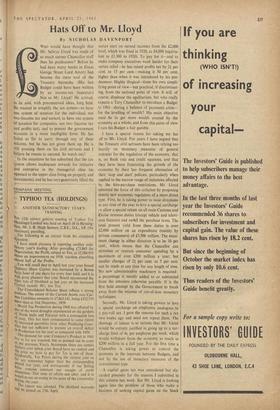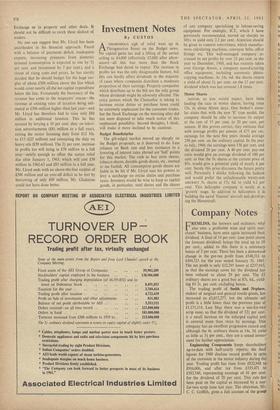Hats Off to Mr. Lloyd
By NICHOLAS DAVENPORT In the meantime he has submitted that the tax 'stem allows inadequate rewards for initiative and enterprise in the managerial class (as Opposed to the upper class living on property and Itivestments). and he has very generously lifted the surtax start on earned incomes from the £2,000 level, which was fixed in 1920, to £4,000 (equiva- lent to £1,300 in 1920). To pay for it—and to make company executives work harder for their surtax relief—he has raised profits tax by 24 per cent. to 15 per cent.—making it 50 per cent. higher than when it was introduced by his pre- decessor. Highly illogical—from his own simpli- fying point of view—but practical, if discriminat- ing, from the national point of view. It will, of course, displease the egalitarians, but who really expects a Tory Chancellor to introduce a Budget in 1961—during a balance of payments crisis- fol the levelling of wealth? His main objective must be to get more wealth created by the economy as a whole, and from this point of view 1 rate his Budget a fair gamble.
I have a special reason for taking my hat off to Mr. Lloyd. For years I have argued that the Treasury civil servants have been relying too heavily on monetary measures of general restraint for the regulation of the economy, that is, on Bank rate and credit squeezes, and that they have been frustrating the growth of the economy by their 'too frequent alternation of their 'stop and start' policies, particularly when applied to the narrow range of industries affected by the hire-purchase restrictions. Mr. Lloyd admitted the force of this criticism by proposing drastic new economic regulators of a more direct type. First, he is taking power to issue directions at any time of the year to levy a special surcharge or allow a special rebate on all main Customs and Excise revenue duties (except vehicle and televi- sion licences) and owell the purchase taxes. The total present yield from these duties is over £2,000 million on an expenditure (mainly by private consumers) of £7,500 million. The maxi- mum change in either direction is to be 10 per cent., which means that the Chancellor can stimulate or restrain consumer spending by a maximum of over £200 million a year; but smaller changes of 24 per cent. or 5 per cent. can be made at any time for any length of time. No new administrative machinery is required: a percentage is merely added to or subtracted from the amounts otherwise payable. It is the first bold attempt by the Government to break away from the miasma of out-of-date monetary techniques.
Secondly, Mr. Lloyd is taking powers to levy a special surcharge on employers analogous to a pay-roll tax. I gave the reasons for such a tax two weeks ago and need not repeat them. The shortage of labour is so serious that Mr. Lloyd would be entirely justified in going up to a sur- charge limit of 4s. per employee per week, which would withdraw from the economy as much as £200 million in a full year. For the first time a Chancellor is taking power to control the economy in the intervals between Budgets, and not by the use of monetary measures of the conventional type.
A capital gains tax was considered but dis- carded precisely for the reasons 1 submitted in this column last week. But Mr. Lloyd is looking again into the problem of those who make a business of seeking capital gains on the Stock Exchange or in property and other deals. It should not be difficult to catch these slickest of traders.
No one can suggest that Mr. Lloyd has been unorthodox in his financial approach. Faced with a balance of payments deficit, inadequate exports, increasing pressures from domestic demand (consumption is expected to rise by 31 per cent. and investment by 7 per cent.), and a threat of rising costs and prices, he has sternly decided that he should budget for the huge sur- plus of about £500 million above the line which would cover nearly all the net capital expenditure below the line. Fortunately the buoyancy of the revenue has come to the taxpayers' rescue—the revenue at existing rates of taxation being esti- mated at £506 million higher than last year—and Mr. Lloyd has therefore had to raise only £80 million in additional taxation. This he has secured by levying a 10 per cent. duty on televi- sion advertisements (£8.1 million in a full year), raising the motor licensing duty from £12 10s. to £15 (£25 million) and reinstating the duty on heavy oils (£50 million). The 2+ per cent. increase in profits tax will bring in £70 million in a full year—nearly enough to offset the surtax relief due after January 1, 1963, which will cost £58 million in 1962-63 and £83 million in a full year. Mr. Lloyd ends with an above-the-line surplus of £506 million and an over-all deficit to be filet by borrowing of only £69 million. Mr. Gladstone could not have done better.















































 Previous page
Previous page